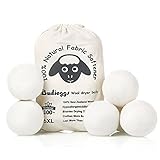In this guide, we’ll show you the best natural fabric softeners. You’ll find out how to keep your laundry soft and static-free without using harsh chemicals. We’ll talk about the benefits of going natural, different types of softeners you can use, and even how to make your own at home. Plus, we’ll recommend some ready-made products that are safe for sensitive skin and better for the planet.
If you want to ditch traditional chemical fabric softeners and use something more natural to prevent static cling and wrinkles, try using a natural alternative. From homemade recipes to popular commercial options, here is everything you need to know about natural fabric softeners.
If you’re seeking a quick recommendation, I personally gravitate towards the Molly’s Suds Natural Fabric Softener Liquid for Sensitive Skin for my washing machine. It’s particularly great when I plan to air dry my clothes. It’s made with plant-based ingredients and is free from dyes and synthetic fragrances, which gives me peace of mind.
When it comes to dryer options, I’ve been using Clean People All Natural Fabric Softener Sheets. They’re convenient, and I love that they’re made with earth-friendly ingredients. Plus, when I use these in the dryer, I don’t need to add anything extra during the wash cycle.
I’ve also noticed that Tru Earth Fabric Softener Strips for the washing machine are gaining popularity. Although I haven’t tried them myself, one of my friends was particularly impressed with how convenient they were to use – just toss a strip in with the wash and that’s it. No measuring, no mess, and no bulky bottles to deal with. Her positive experience has definitely piqued my interest in giving them a try. These strips claim to be hypoallergenic, free of harsh chemicals, and come in zero-waste packaging, which aligns with my values of reducing environmental impact.
If you’re interested in learning more about natural fabric softeners and why they might be a better choice for your household, keep reading. I’ll be diving deeper into the benefits of going natural and will provide you with a more comprehensive list of recommendations by the end of this post.
As someone who loves natural and eco-friendly solutions (so I can avoid unwanted chemicals) whenever possible, I have been using natural fabric softeners for quite a while now.

Traditional fabric softeners often contain potentially harmful chemicals that can be irritating to the skin, harmful to the environment, and not particularly great for the fabric in your projects, either.
Natural fabric softeners provide a gentle yet effective way to soften your clothes while still reducing static and wrinkles.
In this article I will try to summarize my experience in the the world of natural fabric softeners so you can ditch chemical fabric softeners and improve your laundry (and sewing) experience.
What is Fabric Softener?
Why use fabric softeners? Think of fabric softeners as the “hair conditioner” for your laundry. They make your garments and fabrics feel softer and look smoother. Many people use fabric softeners because they:
- Reduce pilling
- Prolongs the life of the fabric
- Soften clothes
- Reduce static cling
- Prevent wrinkles
- Make your clothes smell amazing
If you walk down the laundry products aisle in your favorite store, you’ll find several types of fabric softeners on the market. Some are liquid, while others come in the form of sheets or balls that you add to the washer or dryer.
Unfortunately, these products can sometimes contain synthetic chemicals that I prefer to avoid for a variety of reasons.
Natural vs Synthetic Fabric Softeners

When I originally began researching fabric softener alternatives, I discovered that natural fabric softeners are quite different from their synthetic counterparts. In fact, they typically have fewer chemicals and are gentler on both your clothes and the environment.
They are usually plant-based and biodegradable, making them a much better choice for those with sensitive skin and our planet’s health.
Many natural options are completely free from:
- Sulfates
- Phosphates
- Parabens
- BPA
- Artificial chemicals, colors, allergens, or surfactants.
But have in mind that not all products labeled as “natural” are created equal. There is a gradation in the “naturalness” of these softeners, with some being more natural than others. This means that while a product may market itself as a natural option, it could still contain synthetic chemicals.
Even if it does not contain purely synthetic chemicals, a fabric softener that claims to be natural may still include ingredients that are derived from natural sources but have undergone extensive processing, or it might incorporate other elements that are not entirely natural.
For instance, a softener might use plant-derived ingredients as its base but then add synthetic fragrances to enhance the scent of the laundry. Or an added preservative to prolong its shelf life.
I advise you to read labels and understand the ingredients to determine how natural a fabric softener truly is. Look for certifications and claims that can be verified, such as “100% organic” or “all-natural ingredients.”
Note: Some of the links on this page are affiliate links. This means I will receive a commission if you order a product through one of my links. I only recommend products I believe in and use myself.
It’s also helpful to be aware of common synthetic additives to avoid, and to seek out products that disclose their full ingredient list transparently. For example, let’s take a look at the ingredients listed on the Seventh Generation Natural Fabric Softener – Free & Clear:
- water
- dihydrogenated palmoylethyl hydroxyethylmonium methosulfate (plant-based softener)
- propylene glycol (plant-derived processing aid)
- calcium chloride (mineral-based viscosity modifier)
- sodium carbonate (mineral-based pH adjuster)
- methylisothiazolinone (synthetic preservative).
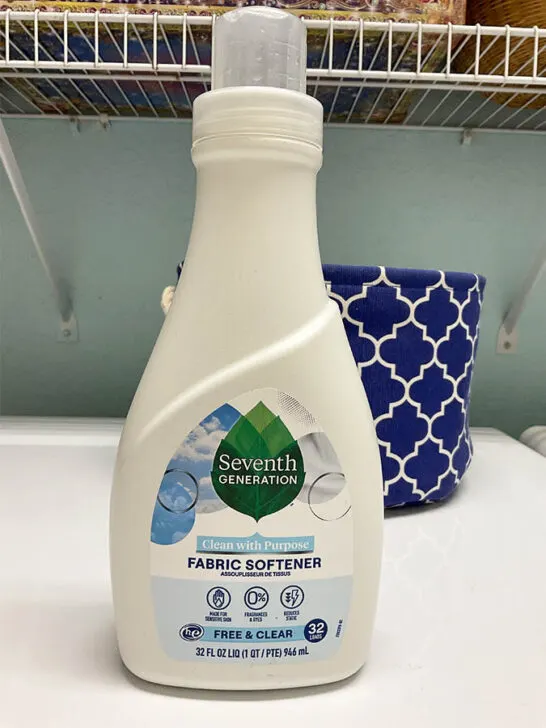
I am not very happy about propylene glycol (see what WebMD has to say about it) but it does not seem to be the main problem here. Let’s take a closer look at the last ingredient mentioned: methylisothiazolinone.
Methylisothiazolinone, often abbreviated as MIT, is a synthetic preservative that’s commonly used in a variety of personal care products, cleaning products, and cosmetics to prevent bacterial growth and extend shelf life. It’s effective at very low concentrations, which makes it a popular choice for manufacturers.
However, methylisothiazolinone has been associated with allergic reactions and skin sensitivities in a large proportion of the population (about 8%, reference here). Its use has become more controversial in recent years, leading to increased scrutiny and restrictions, especially in products that are left on the skin. It was considered problematic enough for the European Union to ban its use (voluntary ban) in leave on products, like creams.
You can read more about it in this article What to Know About Methylchloroisothiazolinone Allergies.
While Seventh Generation is a brand that aims to provide more natural and environmentally friendly options, the inclusion of methylisothiazolinone in their fabric softener illustrates the complexity of formulating products that balance efficacy, preservation, and natural ingredients.
For those who want to ensure they are using the most natural products possible, it might be worth considering homemade fabric softeners, using items like vinegar or baking soda, which can provide a simple and chemical-free alternative to commercial products.
However, for convenience, there are also commercial products available that prioritize using fully natural ingredients without any synthetic additives. It’s all about finding the right balance that aligns with your personal preferences and values concerning natural products.
Synthetic fabric softeners can contain harmful chemicals that can irritate the skin and damage our water systems when released into the environment.
On my recent visit to my daughter’s house, I couldn’t help but notice a bottle of Downy fabric softener in her laundry room. It’s a brand I see practically everywhere, from supermarkets to online stores.
I took a closer look at the ingredients list and found it contains “Conditioning Agent (Diethylester Dimethyl Ammonium Chloride), Stabilizers (Polyquaternium-32; Polyquaternium-33; Pentasodium Pentetate), Thickness Regulator (Calcium Chloride), pH Adjuster (Formic Acid), Colorants, Fragrances, Water.”
While Downy promises to make clothes soft, fresh-smelling, free of wrinkles, static, fuzz, fading, and stretching, I’m cautious about using products with such complex chemical names, especially when they’re in contact with my skin.
It’s important to be mindful of what we’re using in our homes, and I prefer to opt for products with ingredients that are more natural.
Traditional fabric softeners are actually a potent mix of chemicals. It’s concerning to realize that these everyday household products can pose risks to our health and the environment. While they may offer short-term benefits for our laundry, the potential long-term effects on our health and the environment make a strong case for seeking out safer, more sustainable alternatives for softening our clothes.
Benefits Of Natural Fabric Softeners
Although I prefer to avoid unneeded chemicals any chance I can, the fabric softeners can not be avoided entirely. There are a few specific advantages to using natural fabric softeners when compared to the synthetic ones.
Health And Skin Benefits
Natural fabric softeners are typically hypoallergenic and work better for those with sensitive skin. In addition, their non-toxic ingredients make them a much safer option, ensuring that no harsh chemicals will cause irritation or harm the environment.
Environmental Advantages
Eco-friendly fabric softeners are often made from non-toxic, biodegradable materials, which break down into harmless substances. Because of this, they have a lower impact on the environment when compared to their conventional counterparts. Biodegradability is a very important feature, chemicals that last for a very long time (like plastics) are a very big issue for our society.
Also, since they are made from natural materials, they have a lower carbon footprint than popular synthetic alternatives since they do not need to be processed that much.
Fabric Benefits
And finally, believe it or not, natural fabric softeners benefit the fabrics, too, which will help when you work with and sew the material. You’ll notice that they remove static cling, keep clothes soft, and are gentler to help resist wear and tear and extend the lifespan of fabrics.
Types of Natural Fabric Softeners
When it comes to choosing the best natural fabric softener, there are several options available, each with its own benefits and drawbacks.
Dryer Sheets
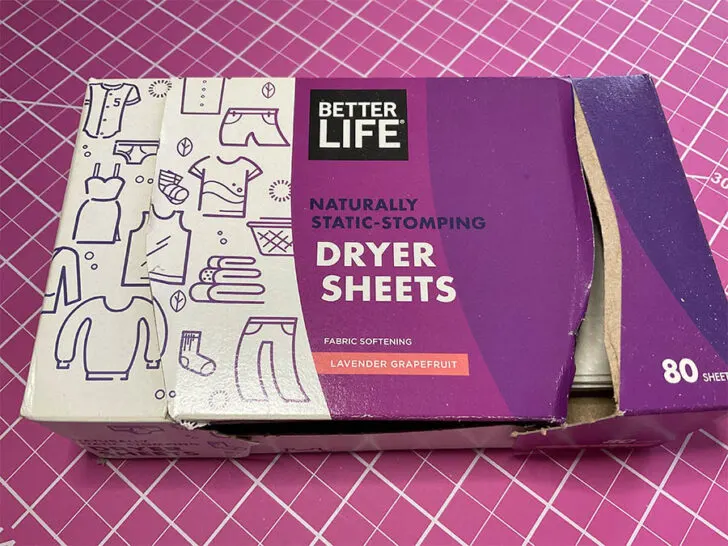
These are a popular choice for many people looking for a natural fabric softener because they are most similar to what people are already familiar with using (and they’re really convenient).
Although these thin sheets can be made from various materials, eco-friendly versions use biodegradable paper infused with essential oils and plant-based ingredients. They reduce static cling and add a pleasant scent to your laundry.
In general, dryer sheets may not be the most sustainable option because they’re single-use items, and some brands contain synthetic fragrances.
I like to use Better Life Natural Dryer Sheets.

Better Life Natural Dryer Sheets, Unscented
Dryer Balls
One of the most eco-friendly fabric softeners out there are drying balls, made from natural materials like wool, that you toss into the dryer with your wet clothes. Wool dryer balls are reusable and have a long lifespan (I’ve used my set for more than six years!), making them environmentally friendly and very cost-effective.
They soften laundry, reduce static, and even shorten drying time by improving airflow in the dryer. And if you want to make your clothes smell nice, you can add your preferred essential oils to these balls for a customized scent.
I use the Zoom dryer balls and they are one of the best rated wool dryer balls on Amazon. There are even better rated alternatives like the Budieggs Wool Dryer Balls Organic.
Liquid Fabric Conditioners
Liquid fabric conditioners are similar to commercial liquid fabric softeners but use natural and plant-based ingredients instead of synthetic chemicals.
Some of the best natural liquid fabric softeners use ingredients like essential oils, vinegar, and baking soda to avoid harsh chemicals and achieve soft, static-free laundry.

Molly’s Suds Natural Fabric Softener Liquid
To use liquid fabric conditioners, add the recommended amount to your washing machine during the rinse cycle (instead of adding them to the dryer, like sheets or balls).
I like to use this one – Molly’s Suds Natural Fabric Softener Liquid for Sensitive Skin
Fabric Softener Strips
Tru Earth Fabric Softener Strips for the Washing Machine offer an innovative and eco-conscious alternative to traditional liquid fabric softeners and pods. They come in the form of pre-measured, ultra-concentrated strips that you simply place in the washing machine along with your laundry. These strips are known for being hypoallergenic, readily biodegradable, and free from parabens and phosphates, catering to those who prefer products with a reduced environmental footprint.
The strips eliminate the need for measuring and prevent any potential spills or messes, making them a convenient choice for busy individuals. Plus, they are suitable for both hot and cold water, which means you can use them with various washing programs.

Tru Earth Fabric Softener Strips
Popular Ingredients in Natural Softeners
There are a few truly natural ingredients you will find in homemade fabric softeners and a bunch more (less than ideal) ingredients often labeled “earth-derived” or “plant-derived” that you’ll find in some commercial fabric softeners.
Vinegar
I like using white vinegar because it effectively softens clothes, neutralizes unpleasant odors, and helps break down detergent residues. That’s probably why it’s also one of the most common ingredients in natural fabric softeners!
It’s also gentle on fabrics and doesn’t cause any damage.
To use vinegar as a softener, I usually just add ¼ cup to ½ cup to the fabric softener dispenser in the washing machine. If you want to add a touch of scent, you can add a few drops of your favorite essential oil to the vinegar.
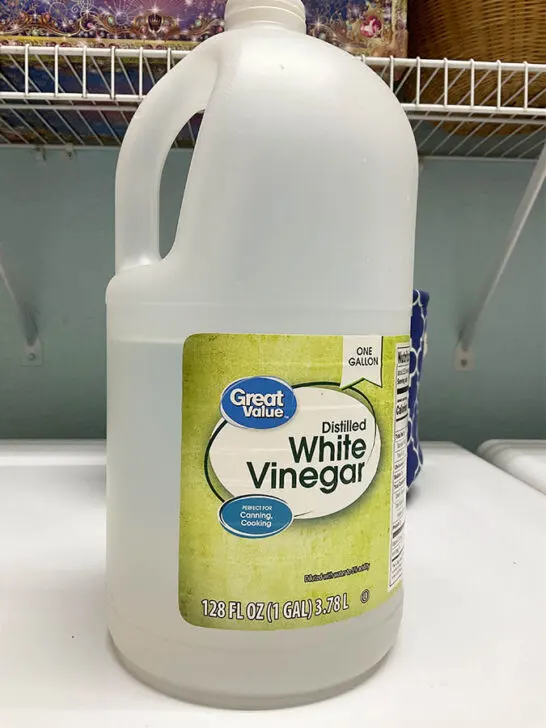
Baking Soda
Another trusty ingredient for natural fabric softeners is baking soda, which is great for neutralizing odors and softening fabrics. Baking soda is in fact one of the preferred methods to remove unwanted smells from places like refrigerators.
I recommend mixing half a cup of baking soda with your laundry detergent in the washing machine. Once your washing cycle is complete, your clothes will be soft and smell fresh and clean!
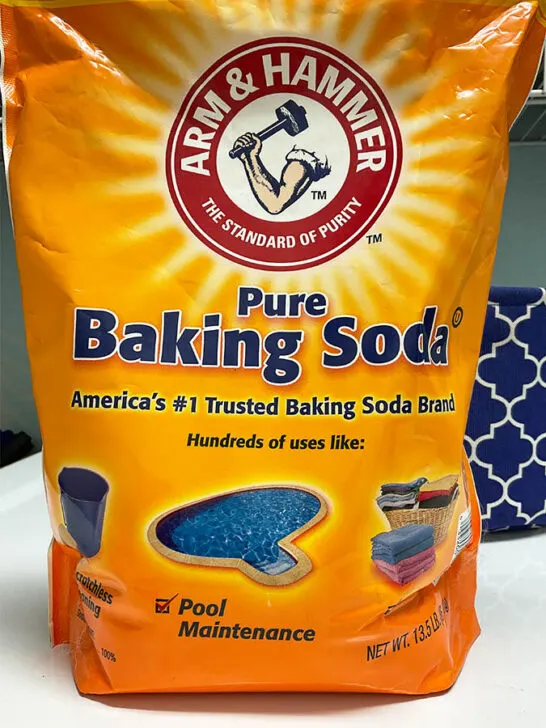
Essential Oils and Scents
I love adding essential oils to my homemade fabric softeners when I want my clothes to smell great. In addition to providing a pleasant fragrance, they also have antibacterial and antifungal properties.
Some of my personal favorites are lavender, lemon, bergamot, eucalyptus, spearmint, and tea tree oil.
To use essential oils in fabric softeners, I add a few drops with vinegar in the fabric softener dispenser.
Please note: using essential oils around pets, especially cats and dogs, can pose potential risks to their health. Certain essential oils, when inhaled or ingested by pets, can lead to adverse reactions such as respiratory issues, gastrointestinal upset, and neurological problems.
Cats, in particular, lack certain liver enzymes that are essential for metabolizing certain compounds found in essential oils, making them more susceptible to toxicity. Dogs may also experience similar adverse effects, especially if exposed to concentrated forms of essential oils.
Plant-Based Additives
Although white vinegar and baking soda are very effective, there are also various non-toxic, plant-based ingredients for natural fabric softeners. For example, you can combine Epsom salt and essential oils to create a simple and effective fabric softener.
Earth-Derived Ingredients
If you make your own natural fabric softeners, you know exactly what’s in them. However, if you buy any commercial products, you still need to check them to make sure that they are truly natural instead of employing the use of semi-deceptive labeling.
Here are some common ingredients you’ll find on commercial natural fabric softener labels with a little translation to help you identify what they are.
- Glycerin – a sugar alcohol with a syrup consistency
- Polysorbate 20 – a surfactant that’s made from corn derivatives, palm kernel oil derivatives, and synthetics
- Sodium bicarbonate – an alternative term for common baking soda
- Xanthan gum – a substance made when the Xanthomonas campestris bacteria feed on glucose from wheat, corn, soy, or dairy
- Sodium benzoate – sodium salt of benzoic acid
- Potassium sorbate – a chemical additive synthetically made from sorbic acid and potassium hydroxide
- Natural fragrance – scents created from nature via steam distillation
Top Homemade Fabric Softener Recipes
Now that you know how natural fabric softeners differ from synthetic commercial products, here are some easy DIY fabric softener recipes you can easily whip up and use.
Homemade Liquid Softeners
Making your own DIY fabric softener can be easy, cost-effective, and eco-friendly. One of the best recipes uses only 2 ingredients to create an excellent, non-toxic natural fabric softener.
Give this simple recipe to try:
- 2 cups distilled white vinegar
- 20-30 drops of essential oil (e.g., lavender, lemon, eucalyptus, etc.) – try mixing and matching!
Mix the vinegar with your preferred essential oil and store the mixture in a glass bottle or container.
Pro Tip: glass containers work best when working with essential oils.
To use, just add 1/4 cup of the liquid softener to the fabric softener compartment in your washing machine.
Baking Soda Fabric Softener
If you want to avoid using white vinegar (or you just don’t have any right now), you can use another pantry staple instead.
Simply mix ½ cup of baking soda into your laundry detergent (if you use pods, you can just put the baking soda into the machine’s drum before adding your clothes) and wash your clothes as normal.
Homemade Dryer Sheets
Anyone who prefers to use dryer sheets can make their own non-toxic and multi-use version with just three items:
- Cotton fabric cut into squares (e.g., cutting up an old shirt works well)
- Essential oils of your choice
- A jar with a tight-fitting lid
Place each fabric square in the jar and add about 5-10 drops of your preferred essential oil.
Close the jar and let it sit for at least 24 hours. When doing laundry, simply toss a fabric square into the dryer along with your clothes.
Pro Tip: After use, simply put the squares back in the jar and add more essential oils so they’re ready to use the next time you do laundry!
DIY Wool Dryer Balls
Although you can buy wool dryer balls, they’re also easy to make yourself. Plus, they’re reusable, chemical-free, and help reduce drying time. Here’s what you’ll need:
- 100% wool yarn
- Old pantyhose
- Essential oils (optional)
Then follow these steps to make and use your wool dryer balls:
- First, wind the wool yarn into a tight ball about the size of a tennis ball.
- Place the ball into a pantyhose leg, tie a knot, and cut off the excess.
- Wash and dry the balls in the pantyhose to help the wool fibers blend together.
- If desired, add a few drops of your favorite essential oil directly on the wool balls.
- Place 3-4 balls in the dryer with your laundry to naturally soften your clothes.
Popular Commercial Natural Fabric Softeners
I am always on the lookout for more natural and eco-friendly options in my home. I have seen many natural fabric softeners on the market. But we can’t try them all I guess.
Despite some products claiming to be more natural than they really are, there are some popular commercial natural fabric softeners that live up to the claims on their packaging. If you prefer to purchase a natural fabric softener instead of making it, here are some that I recommend.
Seventh Generation
This popular brand is easy to find because it’s making a name for itself as a plant-based formula free from dyes and synthetic fragrances. It is also biodegradable. They have an entire line of products that cater to your desire for more natural solutions.

Seventh Generation Natural Fabric Softener
Clean People All Natural Fabric Softener Sheets
Another company I came across is Clean People, which creates natural fabric softeners free from harmful chemicals. Their products use plant-based ingredients, are gentle on the skin and the environment, and deliver excellent results

Clean People All Natural Fabric Softener
Molly’s Suds Fabric Softener Dryer Sheets for Sensitive Skin
Molly’s Suds Fabric Softener Dryer Sheets for Sensitive Skin are designed to cater to those with delicate skin while offering an environmentally friendly alternative to traditional dryer sheets. These dryer sheets are gentle on the skin, which makes them suitable for individuals who may be prone to irritation or allergies from conventional fabric softeners.
The product emphasizes the use of plant-based ingredients and essential oils rather than synthetic fragrances, dyes, or other potentially harsh chemicals.

Molly’s Suds Fabric Softener Sensitive Skin
DR.EASY Dryer Sheets Plant Based Formula
Key features of the DR.EASY Dryer Sheets:
- They are made with ingredients derived from plants, which are often preferred by consumers seeking natural household products.
- The sheets are free from dyes, artificial fragrances, and other common irritants, making them suitable for people with sensitive skin or allergies.
- Instead of synthetic fragrances, these dryer sheets are scented with essential oils, providing a natural and potentially more eco-friendly fragrance option.
- Like traditional fabric softeners, these sheets aim to reduce static cling and help keep clothes wrinkle-free, simplifying the ironing process.

Dryer Sheets Plant Based Formula
An additional benefit of these dryer sheets is their ability to help repel pet hair from fabrics, which is a common concern for pet owners.
Dropps Fabric Softener Pods
Dropps Fabric Softener Pods are an eco-friendly laundry solution designed to soften and freshen clothes without the use of traditional liquid softener. These pods are convenient and mess-free, as they come in pre-measured, dissolvable capsules that you simply add to your washing machine alongside your laundry.
Here are some key features of Dropps Fabric Softener Pods:
- Dropps highlights the use of natural, mineral-based ingredients in their fabric softener pods, which are chosen to maintain and protect clothing fibers while being gentle on the skin.
- The brand focuses on sustainability, offering recyclable and compostable packaging to minimize environmental impact. The pods are free from artificial colorants, dyes, and synthetic fragrances.
- These fabric softener pods are formulated to be dermatologist-approved, making them suitable for individuals with sensitive skin or those looking to avoid potential irritants found in conventional softeners.
- Dropps Fabric Softener Pods are compatible with all types of washing machines, including standard and HE (high-efficiency) models, and they can be used with various fabrics and washing temperatures.
I have been using the Dropps laundry detergent pods for a while now and have been very happy with their easy-to-use design and the results. Plus, I love their ingredients, all the way down to their sustainable, environmentally-friendly packaging!
Although I haven’t tried the fabric softener pods yet (it’s on my list!), if they’re as great as the laundry pods, they may become my go-to product.
The Good Home Natural Liquid Laundry Fabric Softener
It comes in liquid form and is intended to be added to the washing machine during the rinse cycle, much like traditional fabric softeners, but with a focus on natural ingredients.
Here are some key attributes of The Good Home Natural Liquid Laundry Fabric Softener:
- The softener is available in a variety of scents derived from natural sources. Fragrances such as Pure Grass, Beach Days, Lavender, and others are crafted to provide a pleasant and fresh aroma to your laundry without the use of synthetic fragrances.
- The formulation includes biodegradable ingredients, which means they can break down naturally without leaving harmful residues in the environment.

The Good Home Liquid Fabric Softener
Designed to be gentle on both clothes and skin, this fabric softener is a suitable choice for those with sensitive skin or who prefer to avoid harsh chemicals in their laundry routine.
Effectiveness Of Natural Fabric Softeners Compared To Chemical Softeners
In my experience, they can be just as effective, if not more so, at softening fabrics and reducing static cling. We may live in a world of synthetic chemicals, but it’s important to remember the amazing power of plants.
Natural fabric softeners often use essential oils to create delightful yet subtle scents, which can be a major advantage for anyone who finds the strong fragrance of chemical softeners to be overwhelming or irritating.
Allergy And Sensitivity Considerations
For people who have allergies and sensitive skin, natural fabric softeners don’t contain preservatives and artificial colors found in conventional laundry products that can trigger skin irritation, allergies, or even asthma.
I recommend opting for hypoallergenic and all-natural fabric softeners because they are formulated to be gentle on your skin.
I hope this post convinced you that ditching your chemical-filled laundry softener is easier than you may have thought! Whether you make your own or buy a commercially made product, there are lots of non-toxic and environmentally-friendly options available to use!
Did you find this guide helpful? If you did, make sure to save this pin (see below) on your Pinterest board so that you can easily access the article later whenever you need this information on natural fabric softeners. Also, don’t forget to follow me on Pinterest for more tips, tutorials, and inspiration related to fabric, sewing and embroidery.
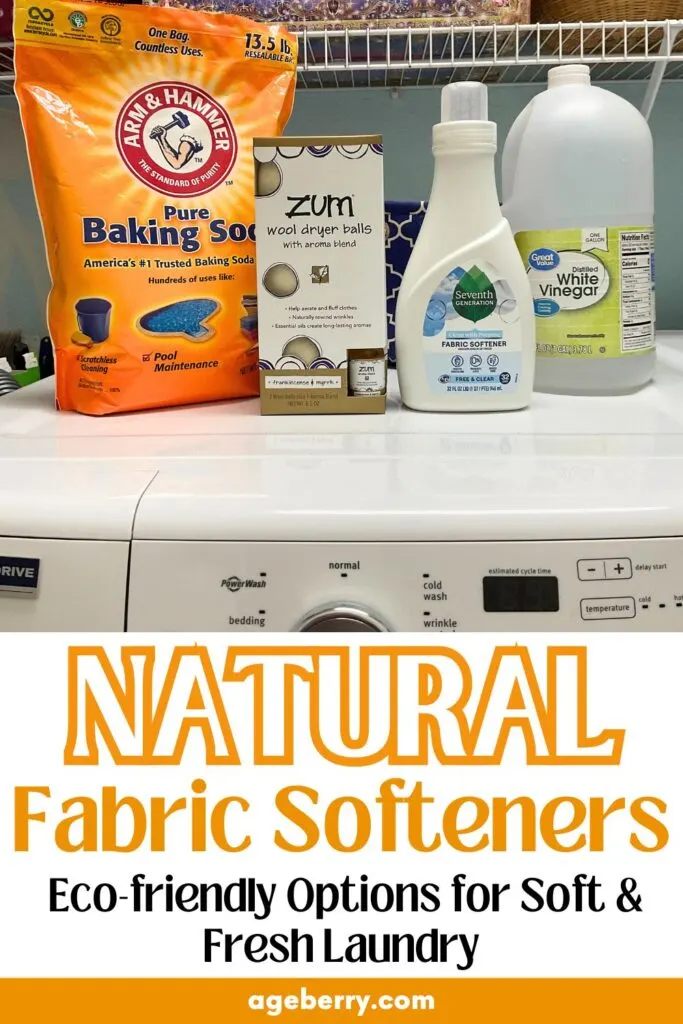
latest posts
- Knot a Problem: Easy Ways to Secure Short Thread Ends
- Ever Tried This on Your Serger? This Differential Feed Feature Will Amaze You
- Ditch My Sewing Machine? Not in This Lifetime!
- Adorable DIY Needle Book | Easy Tutorial for Beginners
- Master the Seam Ripper: Your Ultimate Guide to Precision Stitch Removal
- Think You Know Zippers? This Installation Guide Might Surprise You
- Why Does Your Seam Ripper Have a Red Ball? Discover Its Purpose!
- Topstitching Troubles? This Simple Trick Will Turn It Around Instantly!
- How to Sew Shirring: A Step-by-Step Guide to Elastic Thread Gathering





